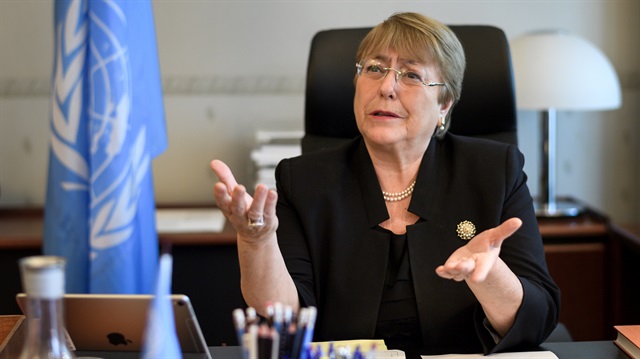
High Commissioner for Human Rights warns all parties to adhere to international humanitarian law
The UN's Human Right Council on Monday expressed concerns over "the ongoing military operations" and their impact on millions of civilians in Syria’s northwestern Idlib province.
In the keynote speech at the 39th session of the Human Rights Council in Geneva, UN High Commissioner for Human Rights Michelle Bachelet said: "We remind all parties to the conflict that they must adhere strictly to all relevant principles of international humanitarian law in the conduct of operations."
The impact of the conflicts on civilians should be minimized, humanitarian aid should be provided, and humanitarian corridors should be opened to ensure that the civilians safely leave conflict-affected areas, Bachelet added.
"Accountability must be a corner-stone of the country's future," she said.
The Syrian regime has recently announced plans to launch a major military offensive in the area, which has long been controlled by various armed opposition groups.
The UN warned last week that such an offensive would lead to the "worst humanitarian catastrophe in the 21st century".
Located near the Turkish border, Idlib is home to more than 3 million Syrians, many of whom fled from other cities following attacks by regime forces.
Bachelet also commented on a recent UN report on Myanmar’s human rights violations and abuses.
She said, "This Council session will be apprised of the deeply shocking findings of the Independent International Fact-Finding Mission on Myanmar."
She referred to the report where the UN documented mass gang rapes, killings -- including of infants and children -- brutal beatings, and disappearances committed by Myanmar state forces.
In the report issued by the UN Independent International Fact-Finding Mission on Myanmar, UN investigators said the violations may have constituted crimes against humanity.
Bachelet called on member states at the council to establish an "independent international mechanism" for Myanmar to collect, consolidate, preserve, and analyze evidence of the most serious international crimes in order to expedite fair and independent trials in national and international courts.
The commissioner added: "This mechanism would also complement and support the preliminary examination of the ICC [International Criminal Court] Prosecutor."
Last week, ICC ruled it could investigate Myanmar for the alleged deportation of Rohingya to Bangladesh as a possible crime against humanity.
The unprecedented decision could expose the country’s politicians and army generals to charges.
The 39th Human Rights Council is held between Sept. 10-28 at the UN headquarters in Geneva.
The council will discuss human rights violations in Syria, Yemen, the occupied Palestinian territory, South Sudan, Somalia, Libya, as well as in the Democratic Republic of Congo.
The three-week session will be carried out with the participation of 25 independent human rights experts, groups and mechanisms.




